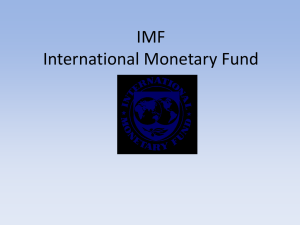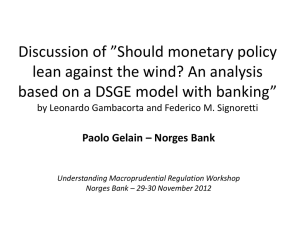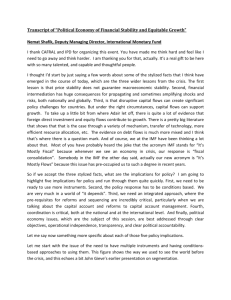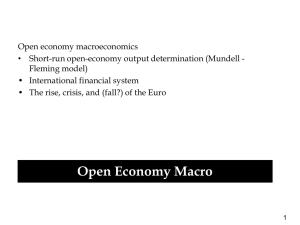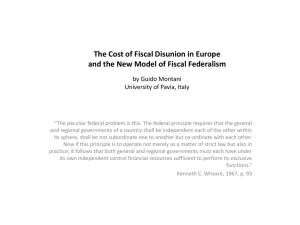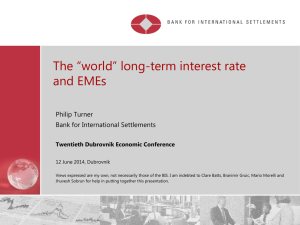The Great Recession, Capital Market Failure and International
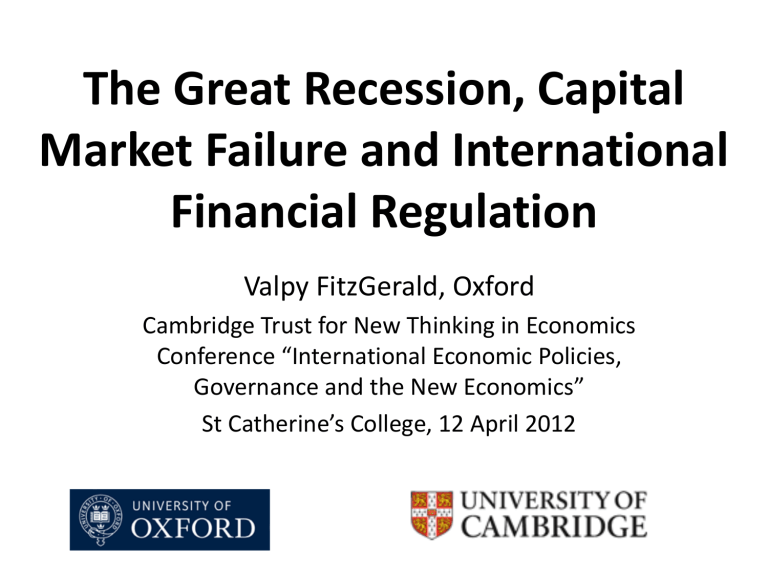
The Great Recession, Capital
Market Failure and International
Financial Regulation
Valpy FitzGerald, Oxford
Cambridge Trust for New Thinking in Economics
Conference “International Economic Policies,
Governance and the New Economics”
St Catherine’s College, 12 April 2012
The issue
• Failures at core of financial system caused major global recession; yet little traction for international financial reform. Why not?
• At first sight, a combination of (i) ideological belief in rational markets; and (ii) intractable global macro-imbalances.
• Yet real obstacles may well be (a) distinct
national models of macro-prudential regulation, and (b) inadequate fiscal base for active policy
Asymmetric fiscal debt overhangs may help explain relative policy space
As do asymmetric savings behaviour
(and thus accumulated asset positions)
Three theoretical problems
• Financial asset demand is inherently unstable; due to suddenly changing risk aversion and mutually contingent asset values (leverage, derivatives etc)
• Balance sheets drive banks; credit flows result from stock adjustment; but asset values are inherently uncertain; and credit markets fail systemically .
• Social function of banks is to convert liquid liabilities to illiquid assets; yet profit objectives and regulatory prudential regulation currently work against this.
Crisis management in the North
• Socialisation of private bank ‘toxic assets’ generated by real estate speculation and unregulated derivatives (US, UK and EU)
• Existing debt levels; political pressure on welfare spend and tax pressure; and capital market risk aversion; mean active fiscal stance short-lived.
• New regulatory initiatives (US, UK and EU) limited to protection of systemically important banks
(SIBs) and payments systems - at national level
IMF view of direction of causation
consequences
• Strengthened bank balance sheets but less productive lending (higher risk aversion); reinforced by previous trend towards origination to distribute rather than hold (less monitoring)
• Abandonment of active fiscal policy (though monetary “easing” continues to support banks) and superficial attraction of “expansionary austerity” despite lack of empirical evidence
• Growth and employment depressed by lack of aggregate demand, low investment levels (public and private) and depressive wealth effects; reinforced by deteriorating income distribution
Crisis management in the South
• Hard lessons drawn from 1990s; so in 2000s debt run down (esp. IMF), reserves accumulated and fiscal surpluses; thus creating ‘policy space’
• New forms of capital controls (particularly through financial levies and bank prudential regulation) instituted and maintained
• Active public management of national external balance sheets as a form of self-insurance; geared to stability and productive investment
consequences
• Continued higher levels of growth; and ability to extend universal welfare benefits (political stability); increasing self-confidence
• However, still dependent on commodity prices
(though cycles now better managed through sovereign funds); and Chinese domestic demand
• But national financial protection (like Noth); lack of regional (let alone international) coordination despite potential leverage through G20
International financial reform
•
Financial reform protective of nation states; a parallel with 1930s absent WTO. Basle III framework designed to strengthen SIBs by reducing risk taking and increasing equity. International bailout bank asset levies stalled.
•
No appetite to stabilise capital flows; or halt speculative
NBFIs. International financial regulation requires action on OFCs: both to reveal asset holdings to regulators and to allow effective tax gathering on capital incomes.
• But G20 debate focusses on “global current account imbalances” particularly EM surpluses held to (a) reflect currency undervaluation; and (b) drive credit boom in
US/EU with low interest rates and ‘excess saving’.
Global macro-financial imbalances
•
Regulatory protection in 2010s instead of trade protection in 1930s (WTO); though current account imbalances still conflictive, focus now on exchange and interest rates.
•
But this is empirically and theoretically incorrect:
– cross-border financing not reflected in net capital flows
(X – Y) but gross flows and balance sheet positions;
– market interest rates are determined by monetary policies, not the saving-investment (= X - Y) balance.
• BIS: “monetary and financial regimes failed to restrain the build-up of unsustainable credit and asset price booms”.
Again, in Emerging Asia gross flows overshadow CAB and reserve movements
Closing (Keynesian) thoughts
• Uncertainty affects asset/liability balances, whose adjustment causes instability. Institutions exist to reduce uncertainty by public goods provision and compensate market failure. A Keynesian not a neoclassical concept.
• Prudential macro-regulation (including bailouts and reserve management) requires bank balance sheet socialisation as Keynes foresaw; yet South is more aware of this than North. An epistemic issue?
• Progress likely not through “world central bank” (IMF or otherwise) – Keynes unhelpful - but central bank coordination (BIS); regional regulatory coordination
(ECB); shared information on (taxable) foreign assets.
Basel Committee on Banking Supervision (2012) Progress report on Basel III implementation Basle:
Bank of International Settlements
Borio, C and P. Disyatat (2011) Global imbalances and the financial crisis: Link or no link? BIS Working
Paper No 346 Basle : Bank of International Settlements
Dow, S. and J. Hilliard eds (2002) Keynes, Uncertainty and the Global Economy (Beyond Keynes,
Volume Two) Cheltenham: Edward Elgar
FitzGerald, V (2007) ‘International risk tolerance, capital market failure and capital flows to emerging markets’ in Mavrotas, G. and A. Shorrocks eds.
Advancing Development: core themes in global economics Basingstoke: Palgrave Macmillan for UNU/WIDER
FitzGerald, V (2012) Global capital markets, direct taxation and the redistribution of income
International Review of Applied Economics 26 (2) pp 241-252
Gallagher,K S. Griffith-Jones, and J-A Ocampo (2012) Regulating Global Capital Flows for Long-run
Development Boston MA: Frederick S. Pardee Center for the Study of the Longer-Range Future. Boston
University
ICB (“Vickers Report”) (2012)
Final Report and Recommendations London: Independent Commission on Banking
IMF (2010) A Fair and Substantial Contribution by the Financial Sector: final report for the G-20
Washington DC: International Monetary Fund
IMF (2011) Global Financial Stability Report
: Chapter 2 “ Long term investors and their asset allocations – where are they now?” Washington DC: International Monetary Fund
IMF (2012) Global Financial Stability Report Washington DC: International Monetary Fund
IMF (2012) World Economic Outlook Washington DC: International Monetary Fund
Montoro C. and L. Rojas-Suarez (2012) Credit at times of stress: Latin American lessons from the global financial crisis BIS Working Paper 370 Basel: Bank of International Settlements
Perotti, R. (2011) The “Austerity Myth”: Gain Without Pain? BIS Working Paper No 362 Basle: Bank of
International Settlements

